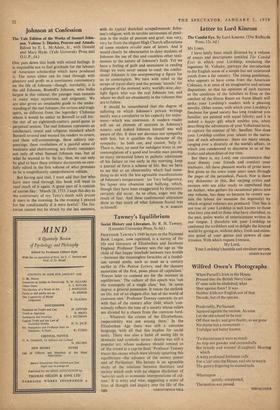Johnson at Confession
The Yale Edition of the Works of Samuel John- son. Volume 1: Diaries, Prayers and Annals. Edited by E. L. McAdam, Jr., with Donald and Mary Hyde. (Yale University Press and O.U.P., £4.) ONE puts down this book with mixed feelings. It is impossible not to feel gratitude for the labours of American scholarship which have produced it. The notes alone can be read through with pleasure and profit as a continuous commentary on the life of Johnson—though, inevitably, it is the old Johnson, Boswell's Johnson, who bulks largest in this volume; the younger man remains in many ways mysterious and enigmatic. We are also given an invaluable guide to the under- standing of the real Johnson, the serious and tragic spirit, so different from the legendary Clubman whom it would be unfair to Boswell to call his: the star of an eighteenth-century panel-game in perpetual session. The real Johnson represents an intellectual, moral and religious standard which Boswell revered and wanted his readers to revere, and these self-communings, these solitary out- pourings, these revelations of a painful sense of weakness and shortcoming, are timely reminders not only of what Samuel Johnson was, but of what he wanted to be. So far, then, we can only be glad to have these intimate documents so care- fully edited in the first volume of what promises to be a magnificently comprehensive edition.
But having said that, I must add that few who have once read through this book will want to read much of it again. A great part of it consists of entries like: 'March 28, 1753. I kept this day as the anniversary of my Tetty's death with prayer & tears in the morning. In the evening I prayed for her conditionally if it were lawful.' The his- torian cannot but be struck by the last sentence,
with its typical doctrinal scrupulousness; John- son's religion, with its terrible seriousness of preci- sion in the midst of passion and grief, was very, very far from the elegant High Church affectations of some modern revolM men of letters. And it would clearly be obscurantist to deny students of Johnson the use of this and countless other testi- monies to the nature of Johnson's faith. Yet we have a feeling of guilt and uneasiness in reading things we were never meant to read; the confes- sional Johnson is too overpowering a figure for us to contemplate. We turn with relief to the scraps of travel-diary and the prosaic 'annals,' for a glimpse of the orotund, witty, worldly-wise, day- light figure who was the real Johnson too, and whom we shall see abundantly in the volumes that are to follow.
It should be remembered that the degree of suffering to which Johnson's private writings testify was a correlative to his capacity for enjoy- ment—which was enormous. A modern reader will see an element of neurosis in Johnson's misery; and indeed Johnson himself was well aware of this. It does not decrease our sympathy with him, but it qualifies the character of the sympathy : he both can, and cannot, 'help it.' There is, then, no need for indulgent irony in our contemplation of a good and lovable man passing so many tormented hours in pathetic admissions of his failure to rise early in the morning, keep a journal or form a scheme of life. But we have to see this as an abnormality which had some- thing to do with the less agreeable manifestations of Johnson's temperament : his Tory belligerence, his lapses into obsession and bullying, which, though they have been exaggerated by detractors, certainly did occur. As so often, anger was the result of fear. And these confessional utterances show us that much of what Johnson feared was










































 Previous page
Previous page